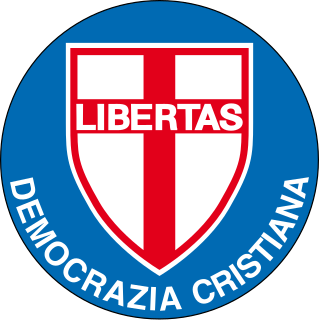 |
|---|
|
The Umbrian regional election of 1980 took place on 8 June 1980.

 |
|---|
|
The Umbrian regional election of 1980 took place on 8 June 1980.

The Italian Communist Party was by far the largest party, gaining almost twice the votes of Christian Democracy. After the election, Germano Marri, the incumbent Communist President, continued to govern the Region at the head of a left-wing coalition with the Italian Socialist Party (Popular Democratic Front).
 | ||||
|---|---|---|---|---|
| Parties | votes | votes (%) | seats | |
| Italian Communist Party | 253,874 | 45.2 | 14 | |
| Christian Democracy | 154,853 | 27.6 | 9 | |
| Italian Socialist Party | 80,202 | 14.3 | 4 | |
| Italian Social Movement | 30,589 | 5.4 | 1 | |
| Italian Republican Party | 14,906 | 2.7 | 1 | |
| Italian Democratic Socialist Party | 14,532 | 2.6 | 1 | |
| Proletarian Unity Party | 7,250 | 1.3 | - | |
| Italian Liberal Party | 5,838 | 1.0 | - | |
| Total | 562,044 | 100.0 | 30 | |
Source: Ministry of the Interior

The politics of Italy are conducted through a parliamentary republic with a multi-party system. Italy has been a democratic republic since 2 June 1946, when the monarchy was abolished by popular referendum and a constituent assembly was elected to draft a constitution, which was promulgated on 1 January 1948.

Christian Democracy was a Christian democratic political party in Italy.

Enrico Berlinguer was an Italian politician, considered the most popular leader of the Italian Communist Party (PCI), which he led as the national secretary from 1972 until his death during a tense period in Italy's history, marked by the Years of Lead and social conflicts such as the Hot Autumn of 1969–1970.

A one-party state, single-party state, one-party system, or single-party system is a type of sovereign state in which only one political party has the right to form the government, usually based on the existing constitution. All other parties are either outlawed or allowed to take only a limited and controlled participation in elections. Sometimes the term de facto one-party state is used to describe a dominant-party system that, unlike the one-party state, allows democratic multiparty elections, but the existing practices or balance of political power effectively prevent the opposition from winning power.

The Italian Communist Party was a communist political party in Italy.

The Communist Party of the Netherlands was a Dutch communist party. The party was founded in 1909 as the Social-Democratic Party (SDP) and merged with the Pacifist Socialist Party, the Political Party of Radicals and the Evangelical People's Party in 1991, forming the centre-left GreenLeft. Members opposed to the merger founded the New Communist Party of the Netherlands.

The Italian Socialist Party was a socialist and later social-democratic political party in Italy, whose history stretched for longer than a century, making it one of the longest-living parties of the country.

The Democratic Party of the Left was a democratic socialist and social democratic political party in Italy. Founded in February 1991 as the post-communist evolution of the Italian Communist Party, the party was the largest in the Alliance of Progressives and The Olive Tree coalitions. In February 1998, the party merged with minor parties to form Democrats of the Left.

The 1979 Italian general election was held in Italy on 3 June 1979. This election was called just a week before the European vote: the failure to hold the two elections at the same time caused much criticism for wasting public money.

The 1987 Italian general election was held in Italy on 14–15 June 1987. This election was the first Italian election in which the distance between the Christian Democrats and the Communists grew significantly instead of decreasing. Two parties that had not previously been in parliament won representation: the Greens with thirteen seats, and the Northern League with two.

The Piedmontese regional election of 1980 took place on 8 June 1980.

The Emilia-Romagna regional election of 1980 took place on 8 June 1980.

The Ligurian regional election of 1980 took place on 8 June 1980.

The Tuscan regional election of 1980 took place on 8 June 1980.

The Sardinian regional election of 1979 took place on 17 June 1979.

The Communist Party is an Italian political party of Marxist–Leninist inspiration, founded in 2009. It defines itself as "the revolutionary political vanguard organization of the working class in Italy".

The Italian regional elections of 1980 were held on 8 and 9 June. The fifteen ordinary regions, created in 1970, elected their third assemblies.

A referendum on the abolition of the wage escalator was held in Italy on 9 June 1985. The escalator allowed for the automatic growth of the salaries of Italian workers at the same rate as inflation. This mechanism was accused of causing high inflation which damaged the lira during the 1980s, with a 20% annual rate. Voters were asked whether they wanted to repeal a law passed by the government of socialist Prime Minister Bettino Craxi which had strongly reduced this automatic mechanisms. The referendum was called by the Italian Communist Party. Those voting "yes" wanted to restore the automatic growth of the salaries as the inflation ratio, and those voting "no" wanted to retain the law which tried to reduce the high inflation.

Proletarian Democracy was a Left-wing political party in Italy.

The Communist Refoundation Party is a communist political party in Italy that emerged from a split of the Italian Communist Party (PCI) in 1991. The party's secretary is Maurizio Acerbo, who replaced Paolo Ferrero in 2017. Armando Cossutta was the party's founder, while Fausto Bertinotti its longest-serving leader (1994–2008). The latter transformed the PRC from a traditional communist party into a collector of radical social movements.